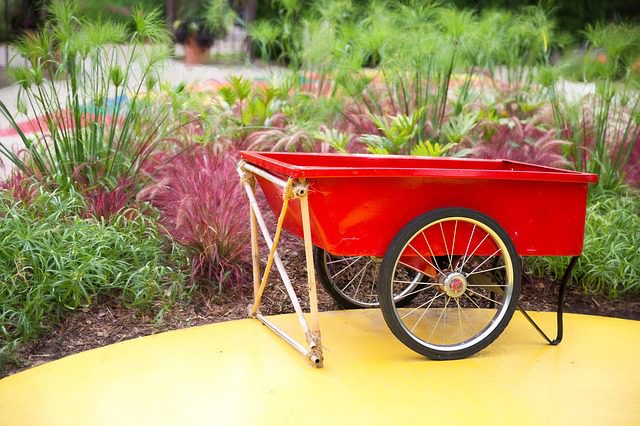
I woke up with anxiety again– the hard, solid, agonizing bezoar of fear and apprehension in the pit of my stomach. The feeling that a SWAT team was going to break down the door, or a tornado was going to demolish the house, or that my husband and daughter were going to die– that level of urgency, over nothing at all.
I heard my violent next door neighbor letting her German Shepherd out on its squeaky chain, starting her weed whacker for the weekly mow-and-cuss. Saturday morning is her day to fuss over her lawn, mowing back and forth until the grass is short as moss and mostly dead, grumbling constantly about us and how disgusting we are. One of the reasons she has harassed and tormented us for seven years now is because we let the dandelions bloom before we mow. The neighbor does not believe in letting things live.
The lump in my stomach expanded, as it always does to a sound from my neighbor, like a balloon slowly filling with cement.
I went downstairs and forced some coffee down my throat. I have not felt like eating normally for days; there’s no room in my stomach. My stomach is where the anxiety lives, and the anxiety doesn’t want roommates.
I got on my computer and opened Facebook, where I saw that this was Community Work Day for the new garden in LaBelle. I had wanted to participate in that. I’d needed to participate in that. Gardening is my obsession, but the menacing neighbor won’t tolerate my gardening. She barely even lets me walk into my backyard anymore. I wanted to go to the community garden, but the anxiety did not want to go. The anxiety did not want me to leave the house. The anxiety threw a tantrum and swelled to about the size of a bowling ball, in protest.
I drove, cautiously, past the community garden, feeling as though the police would drag me off to prison for some surprise offense at any minute. I double checked that I was in the right place, as if I would accidentally start gardening on some other vacant lot and be shot for trespassing. There was a great big mound of chocolatey brown compost in front, and the gate was open. But no one was working on the mound, and there were no tools to be seen.
I had a shovel at home, but I didn’t have anything else to help me move soil.
I drove all the way out to Rural King. I chose a red wheelbarrow, not for poetic reasons but because the red ones were the smallest and could probably fit in my car’s back seat. I also got some planters and gravel for the planter bottoms, to help with drainage. The clerk put my gravel bag into my wheel barrow, where it immediately burst open with the rat-a-tat of a thousand snare drums, expanding the anxiety to the size of a watermelon. In my terror I thought he’d yell at me, but all he did was go and get me a new bag of gravel.
The gravel went into the trunk with the planters. The wheelbarrow was turned on its side cattywampus, where it exactly fit into my back seat. I drove back to the community garden, where I found two other people working with their own dull green wheelbarrow, moving soil into the raised garden beds.
I expected them to yell at me and order me away, but they didn’t. They introduced themselves. The gentleman was the new pastor at a nearby church, and the lady was his wife. We worked together, rotating wheelbarrows so there was always one being filled and one being dumped into the raised beds; all I had to do was shovel, while the gentleman pushed the barrows back and forth. We chatted about weeding and composting, and how we’d use the big empty patch of space that didn’t have any raised beds in it. The lady found that the previous owners of this garden patch hadn’t gotten rid of the asparagus bed, and asparagus was growing beautifully in the place they’d weeded.
Two more people came up in a van. They started pulling up weeds and vines around the chain link fence. We chatted about planting something useful or beautiful on the fence– a tower of strawberry plants, perhaps, or some climbing roses. Then a neighbor and her toddler son ran up to see what was happening on the vacant lot. We explained about the community garden.
“What will you do with what you grow?” she asked.
“Well,” said one of the gardeners, “You can take it home to your family, or if you have extra we’ll put it out on a table for the community to take. Free fruit without the exorbitant prices of Kroger.”
The neighbor looked excited, and said she’d come and plant one of the raised beds for herself later.
I staked out my own raised bed, with the planters and the bag of gravel from my trunk. Then I weeded the bottoms of the other raised beds so they’ be perfectly clear to fill with soil from the wheelbarrows. And while I worked, I talked. We all talked. We talked about where to put benches and flowering trees, what to do with the grant money the organizer of the garden had obtained. We talked about compost hoppers and rain barrels. We talked about how some of the children of LaBelle had never been to a bonfire or harvested fresh food before. I mentioned about the time the neighborhood children didn’t want peas from my backyard garden, because they’d been warned that any plants growing out of the ground were poison, not to be touched. The lady who organized the garden said that was such a shame.
I told them I’m going to plant an indigenous Three Sisters patch this year, heirloom corn with heirloom climbing beans and heirloom squash. I’m also going to plant the fourth sister, towering Hopi Black Dye sunflowers, which the indigenous farmers used to keep the birds off the corn– and tomatoes and potatoes in my little planters alongside the raised bed. I joked that I’d plant every single raised bed if there were any extra.
I told them about my beloved grandfather, who had a house on half an acre, with the most glorious garden you ever saw. He had an orchard with peaches, cherries and apples, so much fruit he used to fill the whole trunk of his van with sacks of it to give away when he drove down to West Virginia for family reunions. He grew a grape alley all along the back of the garage, and we used to play in there, pretending it was a magic tunnel to transport us to Narnia. He had a big patch of strawberries right by the back door so you could top your breakfast with fruit from the garden, just by leaning outside in your pajamas. He grew tomatoes that my grandmother canned into jar after jar of homemade pasta sauce– I was such a picky girl, I didn’t like her homemade sauce because it had chunks in it and wasn’t sweet. I wanted the smooth slurried sugary sauce that came from the supermarket.
I didn’t tell them that this is the anniversary of my grandfather’s death. That was something else I was reminded of in my Facebook memories today. Seven years ago, after a good day of gardening, he fell down the basement steps. He hit the back of his head and had a stroke; they didn’t expect him to wake up, but he did. He opened his eyes and even said a word or two. I didn’t have a car and couldn’t be with him, but my great aunt showed him a video of three-year-old Rosie “reading” a story she’d memorized, and he smiled. And then he let go. I don’t think he wanted stay alive in a hospital bed any longer than he could help. He didn’t like to lie down. He couldn’t stand to be helpless. He wanted to be outside working in the garden, or else he wanted to go home to that other Garden, the one that doesn’t die.
My great aunt texted me that afternoon to tell me he was gone. She said “he loved you very much” and I felt a surge of vertigo, to see him spoken about in the past tense.
He might have been the only person in the world who ever loved me for who I was, instead of tolerating me in the hope I might turn into somebody else.
I have been trying to re-create that beautiful garden ever since.
I suppose part of me thinks that if I do, I’ll find him there in the middle of it, loving me again, in the present tense.
I worked on those garden beds until my arms couldn’t lift another shovel, and then I went home.
I texted the founder of the community garden, to explain I’d left my red wheelbarrow by the patch in case anybody wanted to use it. We chatted for awhile about going back to Rural King and buying some plants or decorations. She’d like me to come along.
I realized the anxiety had shrunk to the size of a walnut. There was room in my stomach for food. I had a big breakfast, at four in the afternoon.
So much depends upon a red wheelbarrow.
So much depends upon a garden.
So much depends on moving soil from one place to another, and pulling weeds, and remembering.
I think I will be all right now.
Steel Magnificat operates almost entirely on tips. To tip the author, visit our donate page.













